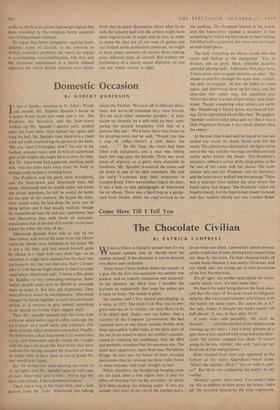Domestic Occasion
By ROBERT ROBINSON
lT was a Sunday morning in St. John's Wood, and outside Mr. Stephen Spender's house in Loudon Road stood two vans and a car. The Producer, his Secretary, and the Interviewer walked up Mr. Spender's garden path, pushed open the front door, then tiptoed out again and rang the bell. Mr. Spender took them into a room with red walls overlooking the garden at the back.
'Do you want Christopher now?' he said in his hushed, anxious voice, with its hint of suppressed glee at the frights life might have in store for him, But Mr. Isherwood had appeared, standing stock still, with his arms held away from his body as though ready to leap a vaulting horse.
The Producer and his party were introduced, and the Interviewer and Isherwood were left alone. Isherwood said he would rather not know the actual questions, he felt he would do better on the spur of the moment. He hoped the inter- view would work, he had done the same sort of thing before and it had usually worked; though he remembered how he and one interviewer had tied themselves into such knots of non-com- munication that at the end of it neither could have asked the other the time of day.
Isherwood glanced from side to side of the Interviewer, and waved his arms from the elbows while his elbows were balanced on his knees. He is not a tall man, and had seated himself quite by chance in a chair with very short legs—to an onlooker, it might have seemed that the chair was particularly his ('no, not that one, that's Christo- pher's') and that he might expect to find it in some usual place. Isherwood said : 'I wrote a film about the Buddha—a very interesting enterprise. Some Indian people came over to MGM to persuade them to make it. But they got frightened. They were afraid it would he too expensive.' Isherwood clapped his hands together at each conversational period, as if anxious to give himself something to do should no further topic suggest itself.
Then Mr. Spender stooped into the room with a tray on which were a jug of coffee, and cups. He set it down on a small table, and withdrew. For some time the coffee remained untouched. Finally, the Interviewer asked Isherwood if he would have a cup, and Isherwood said he would not. Caught with the jug in his hand, the Interviewer may have realised that having usurped the function of host, he might seem to have done so out of greed. No one would ever know.
But the technicians were entering the room to set up lights, and Mr. Spender came in with cans of beer. Isherwood said to him : 'We've had the interview already. Like a premature sneeze.'
There was a ring at the front door, and a lady arrived from the Taller. Isherwood was talking about the Thirties. 'We went off in different direc- tions, but we've all remained very close friends. We see each other whenever possible.' A tech- nician sat decently on a sofa with his beer, com- paring the present hospitality with that of a famous film star : 'We'd been there four hours in his drawing-room and he said, "Would you like a cup of coffee—there's a cafe down the road. . . ." ' By this time, the room had been filled with equipment, and a man was rolling back two rugs near the fireside. There was some sense of urgency, as a party were expected to luncheon. Mr. Spender re-entered the room and sat down in one of his own armchairs. He said the early Victorians kept their mistresses in Loudon Road. There was another ring at the door. It was a lady to take photographs of Isherwood for an album. There was a third ring as a gentle- man from farther down the road arrived to do the cooking. The Producer looked at his watch, and the Interviewer opened a window; it was something he would not have done an hour before, but filled with equipment, the room was no longer an individual place.
The lady compiling an album strode into the room and looked at the equipment. 'Yes, in France, not so good. Here, splendid pictures, splendid photographs. Television first-class here. I have never seen so good pictures, so clear.' She strode to and fro through the open door, vanish' ing only to reappear. At last she failed to come again, and Isherwood drew up his chair, and the interview was under way, the questions put. 'Every fan-letter is a sort of love-letter,' said Isher- wood. 'People wondering what writers are really like. Wondering if Henry James was fond of fish- ing. To be speculated about, like that.' He giggled. 'Spender used to make jokes and say that I was a little Napoleon because I was much shorter than the others.'
At the end, Isherwood said he hoped he had not smiled too much, he shook hands and left the room. The camera Was dismantled, the lights taken out to the van, and .the two rugs unrolled and laid neatly down before the fender. The Producer's secretary rubbed a corner of the large piano at the far end of the room with her sleeve. The tech- nicians left, and the Producer and his Secretary and the Interviewer walked into the passage. There was a murmur from behind the door where the lunch party had begun. The Producer raised his hand to knock, but the Interviewer shook his head, and they walked silently out into Loudon Road.






































 Previous page
Previous page